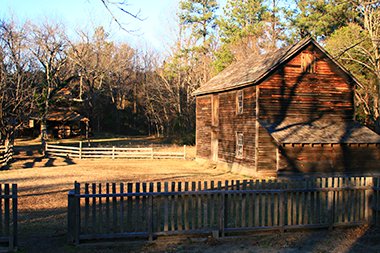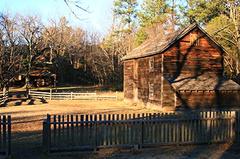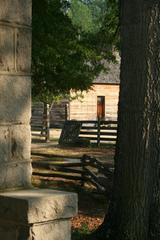
Visiting Duke Homestead State Historic Site: Hours, Tickets, and Tips
Date: 31/07/2024
Introduction
Nestled in Durham, North Carolina, the Duke Homestead State Historic Site is a notable landmark that offers visitors an immersive experience into the history of the tobacco industry and the influential Duke family. This guide will provide you with all the details you need to plan a memorable visit, including historical insights, visitor information, travel tips, and nearby attractions. Whether you are a history enthusiast, a student, or a curious traveler, the Duke Homestead offers a unique glimpse into the rise of one of America’s most significant industries and the family that helped shape it. (Duke Homestead, Discover Durham)
Table of Contents
- Introduction
- History and Significance
- Visitor Information
- Cultural and Educational Programs
- Visitor Experience
- FAQ
- Conclusion
History and Significance
Early Beginnings and Founding
The Duke Homestead State Historic Site, located in Durham, North Carolina, is a significant landmark in American history, particularly in the context of the tobacco industry. The site was the home and farm of Washington Duke, who began cultivating tobacco in the mid-19th century. Washington Duke, born in 1820, was a farmer who turned to tobacco cultivation after the Civil War. In 1865, he began producing smoking tobacco, which he initially sold locally. His small-scale operation laid the foundation for what would become one of the largest tobacco empires in the world.
Growth of the Tobacco Industry
Washington Duke’s business rapidly expanded due to the increasing popularity of tobacco products. By 1874, the Duke family had established W. Duke, Sons & Co., which became a major player in the tobacco industry. The company innovated in marketing and production techniques, including the use of cigarette rolling machines, which significantly increased production capacity. This innovation was crucial in transforming the tobacco industry from a labor-intensive craft to a mechanized industry.
The Duke family’s business acumen and strategic decisions, such as the aggressive marketing campaigns and the establishment of a nationwide distribution network, played a pivotal role in their success. By the late 19th century, the Duke family had become one of the wealthiest and most influential families in the United States.
Formation of the American Tobacco Company
In 1890, Washington Duke’s son, James Buchanan Duke, orchestrated the formation of the American Tobacco Company by merging several leading tobacco companies. This conglomerate controlled a significant portion of the American tobacco market and became a dominant force in the industry. The American Tobacco Company was one of the first examples of a modern corporate monopoly in the United States.
The company’s dominance was so extensive that it attracted the attention of the federal government. In 1911, the U.S. Supreme Court ruled that the American Tobacco Company violated antitrust laws and ordered its dissolution. This landmark case was a significant moment in the history of American business and antitrust regulation.
Impact on Durham and North Carolina
The success of the Duke family’s tobacco business had a profound impact on Durham and the state of North Carolina. The wealth generated by the tobacco industry contributed to the economic development of the region. Durham transformed from a small agricultural community into a bustling industrial city. The Duke family’s philanthropy also played a crucial role in the development of educational and healthcare institutions in the area.
One of the most notable contributions was the establishment of Duke University. In 1924, James Buchanan Duke established The Duke Endowment, a philanthropic foundation that provided substantial funding for the creation of Duke University. Today, Duke University is one of the leading research universities in the world, known for its academic excellence and contributions to various fields of study.
Preservation and Historical Significance
The Duke Homestead was preserved as a historic site to commemorate the legacy of the Duke family and their contributions to the tobacco industry and the region’s development. The site includes the original homestead, tobacco barns, and a factory where visitors can learn about the history of tobacco cultivation and production.
The Duke Homestead State Historic Site offers a glimpse into the life and times of the Duke family and the early days of the tobacco industry. It serves as an educational resource, providing insights into the economic, social, and cultural history of the region. The site is managed by the North Carolina Department of Natural and Cultural Resources and is open to the public for tours and educational programs.
Visitor Information
Duke Homestead Visiting Hours and Tickets
The Duke Homestead State Historic Site is open to visitors from Tuesday to Saturday, 9:00 AM to 5:00 PM. It is closed on Sundays, Mondays, and major holidays. Admission to the site is free, although donations are appreciated to help with the preservation and educational programs. (Duke Homestead)
Accessibility
The site is accessible to visitors with disabilities. There are wheelchair-accessible paths and facilities available, ensuring that all visitors can enjoy the historical and educational offerings of the Duke Homestead. (Discover Durham)
Travel Tips
- Best Time to Visit: Spring and fall are ideal times to visit, as the weather is mild and the natural surroundings are particularly beautiful.
- Guided Tours: Take advantage of the guided tours offered by the site, which provide in-depth information about the history and significance of the Duke Homestead.
- Nearby Attractions: While in Durham, consider visiting other historical sites such as the Bennett Place State Historic Site and the Museum of Durham History.
Cultural and Educational Programs
The Duke Homestead State Historic Site hosts various cultural and educational programs throughout the year. These programs include guided tours, historical reenactments, and special events that highlight different aspects of the site’s history. The site also features a museum with exhibits on the history of tobacco, the Duke family, and the broader historical context of the period.
One of the key educational initiatives is the Tobacco History Lecture Series, which features talks by historians and experts on various topics related to the history of tobacco and its impact on society. These lectures provide valuable insights and foster a deeper understanding of the complex history of the tobacco industry.
Visitor Experience
Visitors to the Duke Homestead State Historic Site can explore the original homestead, which has been restored to reflect its appearance in the late 19th century. The site includes several historic buildings, such as the main house, tobacco barns, and a packhouse. The museum offers interactive exhibits and displays that provide a comprehensive overview of the history of tobacco cultivation and production.
The site also features walking trails and picnic areas, allowing visitors to enjoy the natural beauty of the area. The Duke Homestead State Historic Site is a popular destination for school groups, history enthusiasts, and tourists interested in learning about the history of the tobacco industry and its impact on American society.
FAQ
What are the visiting hours for Duke Homestead? The Duke Homestead State Historic Site is open from Tuesday to Saturday, 9:00 AM to 5:00 PM, and is closed on Sundays, Mondays, and major holidays.
How much are tickets to Duke Homestead? Admission to the site is free, although donations are appreciated.
Is Duke Homestead accessible for visitors with disabilities? Yes, the site has wheelchair-accessible paths and facilities available.
What other attractions are nearby? Nearby attractions include the Bennett Place State Historic Site and the Museum of Durham History.
Conclusion
The Duke Homestead State Historic Site is a significant landmark that offers valuable insights into the history of the tobacco industry and the legacy of the Duke family. The site’s preservation and educational programs ensure that this important chapter of American history is remembered and appreciated by future generations. Visitors to the site can gain a deeper understanding of the economic, social, and cultural history of the region and the pivotal role played by the Duke family in shaping the modern tobacco industry.
Call to Action
Plan your visit to the Duke Homestead State Historic Site today! For more information, check out the official Duke Homestead website, follow us on social media, or download the Audiala mobile app for the latest updates and more historical insights.
References
- Duke Homestead, n.d., North Carolina Department of Natural and Cultural Resources source url
- Discover Durham, n.d., Discover Durham source url
- Historic Sites NC, n.d., North Carolina Department of Natural and Cultural Resources source url





